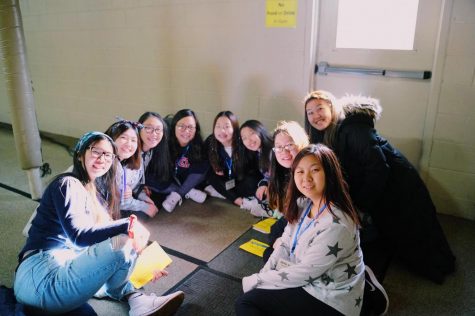Building friendships as a first-generation student
February 22, 2021
Because I attended an elementary school with an Asian population of less than 3%, my immigrant parents often worried if I would fit in with the other students. I firmly remember naturally gravitating towards the other 1 or 2 Asians in my class every year. However, as students enter into high school, specifically those who are first-generation immigrants, they gain more freedom and knowledge on their preferences regarding their friendships. So the question becomes, how exactly does being a first-generation student affect those preferences?
Some students like Inesa Linker (‘23) enjoy hanging out with people who have a different ethnic background than her own.
“I feel that it is easier to get closer to someone when there isn’t as much judgment. With people who have a similar ethnic background, I always feel a level of judgment of whether or not I am Jewish or Ukrainian enough.”
Being a first-generation Ukrainian who does not speak her native language and growing up in a non-religious household, Linker feels that those things make her less connected to her culture. When students with the same ethnicity as her attend synagogue and speak Ukrainian, she can’t help but feel different although they share the same background.
“It ends up being something that separates me rather than something to form a bond over,” Linker said.
While she struggles to share commonalities with people of her own tradition, Linker has learned a lot from being friends with people of different cultures.
“I’ve learned about how they use their culture to shape their lives, and while that knowledge isn’t deep or philosophical, and honestly seems very obvious, it’s really nice to gain that connection with someone.”
Other first-generation immigrant students, such as Ziv Amsili (’22) and Esther Tian (’22), prefer building friendships with students who share similar cultural traditions.
“They tend to understand me better and I feel more comfortable knowing that they can relate to me,” said Tian.
Tian, a first generation Chinese-Korean, values the reassurance that she finds in having a friend who is able to connect with her through culture related experiences. Although she has not faced major struggles with making friends, she has experienced trouble fitting in with people outside of her ethnic bubble due to the challenge of finding things to bond over.
Interestingly, Amsili, who is a first-generation Israeli, shared that she has noticed that many of her friends are first-generation immigrants themselves.
“Maybe because my parents are friends with a lot of Israelis, they also have kids that may be the same age as me, so through our parents, we get to know each other,” Amsili said. In addition to this, especially in her Jewish community, Amsili was able to form friendships through attending the same synagogue as her friends and through their parents who feel more comfortable with those who speak the same language as them.

As for myself, while I have a diverse group of friends, I am definitely more comfortable with my fellow Korean or Asian American friends. Some of my closest bonds have been formed through my Korean church. Nonetheless, that was only possible because there was a Korean church in my area. From personal experience, who I choose to be friends with really depends on my personal interests and the ethnic environment of the area that I live in.
It is safe to say that culture and tradition play a large role in the lives of first-generation immigrant students. But it’s just a matter of one’s distinctive values and beliefs when it comes to building relationships.